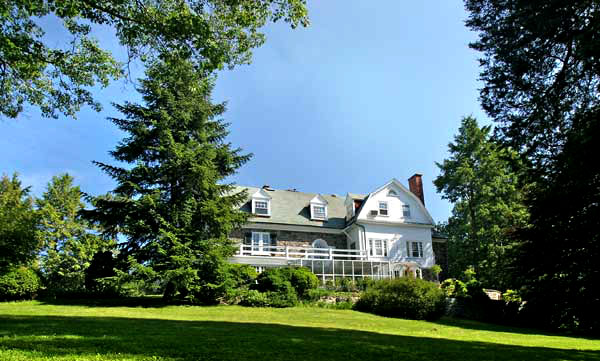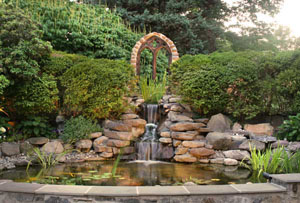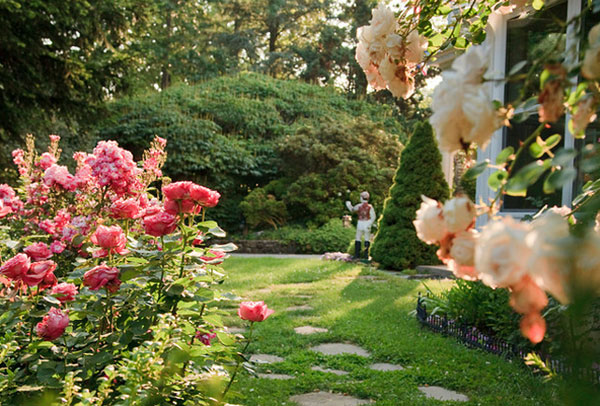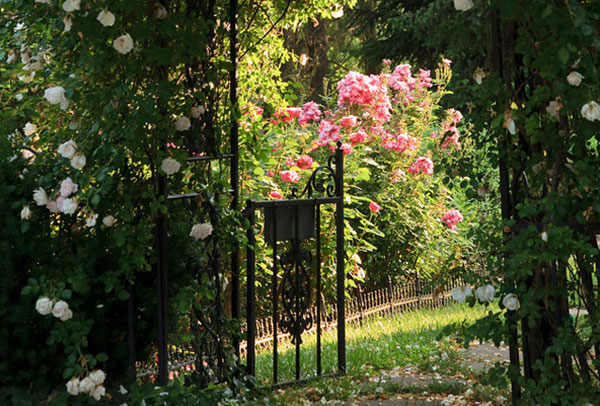Relationship Rejuvenation
 All pictures are of Hamanassett B&B and the grounds.
All pictures are of Hamanassett B&B and the grounds.
“A successful marriage requires
falling in love many times, always with the same person.”
-Mignon McLaughlin, Journalist
“Marry me,” she said, that enlivening mix of adoration and mischief in her eyes.
“Where’s my ring?” I joked. Two months later, on the one year anniversary of the weekend we met, we were engaged. That Spring we were wed. This past Spring, we just celebrated our first decade together. Amen.
“Most couples feel positive about their relationship when they first wed,” says Susan Heitler, Ph.D. “Over time, however, differences in habits and preferences can cause seemingly well-matched couple to find their matrimonial bliss getting tarnished” (2012). This is true for Suzanne and I, just as it’s true for every married couple. These last ten years have been the best of my life as well as some of the most challenging. The “tarnish” of wedded bliss is simply the dirt of daily life. “Matrimonial partnership is a high-skilled activity,” Heitler notes, and one of those skills is how to rub off the tarnish and get that wedded bliss shining again.
This is why, once a year, Suzanne and I return to the place of our engagement and our “mini-moon” Hamanassett Bed and Breakfast* in Media, PA. Ten years ago we knew that we wanted to get engaged one October 25th weekend. We chose the most romantic, highly rated B&B we could find. We had no idea that this choice would also be one of the most formative of our marriage and part of the yearly renewal of our love affair.
Marriage is more than the expression of “our overarching need for biological attachment” says Rachel Clark, Biologist and Science Writer, though it is that. She says that matrimony is a growing study of the relationship between biology, emotionality and reality “and how we can use an understanding of that to make marriages thrive. Mature, enduring love is a choice in how we relate to others, and too often we don’t realize or use that knowledge” (2011).
For my wife and me, the first choice was to wed. The second choice was in Hamanassett, and we return there every year to review the past years’ choices, get excited for those to come and renew the one that is most important; “Mature, enduring love is a choice,” Clark says, and Heitler adds that “for smooth sailing in a truly forever relationship, stay savvy, savor your love, and make sure that you learn the skills for sustaining a strong and loving marriage.” Here in the Spring, season of rebirth, those sustaining skills can easily be paralleled by the same ones you may already be thinking about in your garden.
We return to Hamanassett, with its own beauty and botanical splendor, but in our hearts we return to the soil of our love, the seeds of matrimony that we planted ten years ago, the blossoms and fruit of our labors…and all of the crap that will choke it lifeless if left uncared for.
Clearing Out the Deadwood and Briars
“Love + Skills = Happy Marriage.”
-Susan Heitler, Ph.D.
Like a garden, all marriages are impacted by their environment, and have an impact on it. That impact can be  profound. Sound “…partnerships spin an extended web of community and support systems,” according to Clark (2011), “creating security and stability not only for their own children, but for their friends, neighbors, other children, and well beyond. They are the core nucleus of safe harbor. They are generative. They create. They inspire.” How great is that? Having a marriage that is generative creates and inspires sounds like one of the most vital and honorable things a person could do.
profound. Sound “…partnerships spin an extended web of community and support systems,” according to Clark (2011), “creating security and stability not only for their own children, but for their friends, neighbors, other children, and well beyond. They are the core nucleus of safe harbor. They are generative. They create. They inspire.” How great is that? Having a marriage that is generative creates and inspires sounds like one of the most vital and honorable things a person could do.
It’s not a walk in the park. Marriages are just as impacted by their environment. Healthy marriages are generative, and we long to be productive people, but the daily grind can also wear at our energy level, which makes us too tired to love as we should. Healthy marriages are creative, and that usually involves a busy schedule which can eat at our open time, so that we don’t share it as we would. Health marriages are inspirational, usually to those on the outside—coworkers, family, friends, neighbors—but unexpressed or ill-expressed thoughts and feelings choke our hearts and minds with fears and doubts, and thus our marriage relationship.
The key to finding a healthy balance is the skill of clear communication, just like weeding your garden, as “all matrimonial communication is not equal,” (Heitler, 2012). Take time to pull out the dead stuff that’s come between you and your spouse, like old arguments or bitterness. Adjust your together time so that the schedules that have been thrown out of whack come together better. Most of all, talk about all of this, but effectively. Remove the briars, but don’t poke each other with the thorns. “Effective communication about sensitive subjects enhances intimacy,” says Heitler, “Positivity in your language nourishes loving connecton. Hurtful communication invites negative emotions, resentment and distancing.” Remember the goal is to clear out the deadwood so that you grow closer, not move to opposite beds.
Tending the Land we Love
“My green thumb came only as a result of the mistakes I made
while learning to see things from the plant’s point of view.”
-H. Fred Dale, Gardener
We can better see the marriage relationship—and how it has weathered the Winter—once the deadwood is cleared away. Take a moment to look over yours.  Where is it still beautiful? Where has it grown into a more attractive shape that just needs a bit of definition? Where does it need repair? For the moment look only at the whole garden, keeping in mind that a healthy marriage can “spawn a host of health benefits including reducing the impacts of stress and mental health problems, and increasing longevity, among others” even yours! (Clark, 2011)
Where is it still beautiful? Where has it grown into a more attractive shape that just needs a bit of definition? Where does it need repair? For the moment look only at the whole garden, keeping in mind that a healthy marriage can “spawn a host of health benefits including reducing the impacts of stress and mental health problems, and increasing longevity, among others” even yours! (Clark, 2011)
Now zoom in on some less attractive areas. Most often when we think of the state of our relationships we place too much focus on how happy we are and how much we argue. I’m a believer that a happy marriage is part of a happy life and vice-versa. Therefore if you find you’re unhappy in your marriage, the first look should be at yourself then your spouse. You may be unhappy with yourself or your life and it comes out as fighting your spouse. Own that for later. Also, Heitler gives us hope in terms of the fights that truly are about our spouse. “Arguing does not mean that the two of you are not a good match. It means you’d better upgrade your anger management, partnership communication and shared-decision-making skills.” That is where you pull on those garden gloves and tend that garden.
Water: Has your marriage been “dried out?” then it needs a constant flow of refreshment; some way you both can re-appreciate the ways you fulfill each other. Before even physical intimacy, relational “intimacy especially thrives when couples communicate openly about what they feel when the feelings are positive” (Heitler, 2012). This can be as simple as a consistent deeper dinner conversation or complex as a shared ongoing activity. A getaway like the wife and I do at Hamanassett is a great first soak of a garden, but that’s where we also look at our couple’s time for the summer ahead. The goal is setting a system of refreshing each other. I’ve worked with some couples where hidden notes and cards around the house provide refreshment throughout weeks too busy to schedule. The form is not important, the function is life-giving.
Soil: Some of us may feel they’re already up to their neck in fertilizer in their marriage, but all joking aside, the nourishment that your marriage is grounded in is just as vital to health. Here’s the hard part; the plants do not nourish each other in a garden. Remember that first look at your personal happiness? Each plant must be fed by their own ground. If you come home tired, wake stressed, sad or live worn—though you may take it out on them—that’s not usually your spouse’s responsibility to fix. Your spouse can, and should, help you and support you in refertlizing yourself, maybe with something as small as a hobby or as large as education or a change, but you must be in charge of finding what depletes your soil.
Sun: Heitler talks about “…sending out good vibes and on gratitude in marriage,” like the light which changes the nutrients of the soil and refreshing water into nourishment, “the more agreement, appreciation, and fun you share, the happier you will feel in your relationships” and the more sustaining they will be in the year to come.
Living in Encouraging Expectation
“For two people in a marriage to live together day after day is
unquestionably the one miracle the Vatican has overlooked.”
-Bill Cosby
Okay, you’ve cleared and tended. Now what? Stand in front of the plot of turned dirt and yell “Grow!?” Tap your foot and check your watch? Roll your eyes at the still unbloomed bush in that “we talked about this, but look at you” way?
Of course not, unless you’re seeking the “crazy gardener” title on your block. We wait in confident and expectant faith that our work will bring forth the beauty we envision. I believe that we don’t do enough collaborative planning of our marriage in our marriage. Sure, we plan the weekend, dinner or the bathroom remodel. When Garden’s Alive or Burpee send their seed catalogs, we sit down to imagine and plan our gardens, but we don’t make time, sit down and plan our vision for the marriage itself.
We should. What is your vision for yourself (your soil) in a few months or years? What is your shared vision for your marriage relationship (watering) over the same time frame? How do those three visions; self, spouse and marriage relationship, fit together? The less stress and more sharing you envision, the more sunshine you’ll feel.
But don’t expect immediate change. Gardens are a game of seasons and years. Be confident in your shared vision, in continuing to tend it together and in the expectation that the blooming is happening, just under the soil first, where it’s most crucial. Most of all, when the confidence gets thin, the daily grind grinds or the arguments return “assume that you both are sensible and intelligent people. That’s part of why you chose each other,” says Heitler. “So listen for what’s right, what makes sense, instead of what’s wrong with what your partner tells you.” That concern or conflict could be an indicator that the vision needs to change, which is great. “Add your partner’s views to your own and the odds zoom up that you will succeed in traveling together the road to ever-more-loving partnership” (Heitler, 2012).
The value of a healthy garden is the bloom and the benefits. Marriage is the same. Clark says that health marriages “model unconditional love and relationship success. Their spouses and children have what has sadly become a privilege, rather than a right to go forth in the world from a secure, enduring community” (2011). We and our children are the seeds of our marriage garden. In America, as Clark says, we more often find those gardens choked with weeds, depleted and neglected. Healthy marriage has “become a privilege, rather than a right,” but with a little seasonal care that can change. For my wife and I, that care restarts each Spring at Hamanassett. If it starts there for you, that’s great, see the link* below. The collaborative care must happen, regardless of location, and when it does, a beautiful garden will be the reward.
__________________________________________________
*If you are interested in Hamanasset, please click here for their beautiful and informative website (including rooms, rates, specials and many more pictures) or click here for my, and other, Tripadviser.com reviews. You will have a splendid time and please tell Ashley that Suzanne and I said “Hello!”
Clark, Rachel. (2011) “I Do” for Good: How to Vote for Epic Marriage. Retrieved from:
http://www.psychologytoday.com/blog/marry-divorce-reconcile/201111/i-do-good
Heitler, Susan. (2012) Marriage: 8 Dangerously Wrong Conventional Wisdoms…for a new you and a new marriage. Psychology Today. Retrieved from: http://www.psychologytoday.com/blog/resolution-not-conflict/201208/marriage-8-dangerously-wrong-conventional-wisdoms


